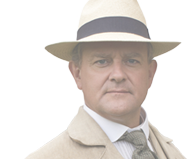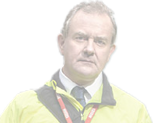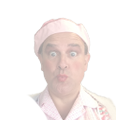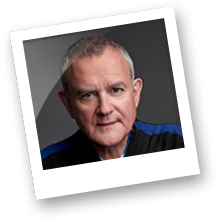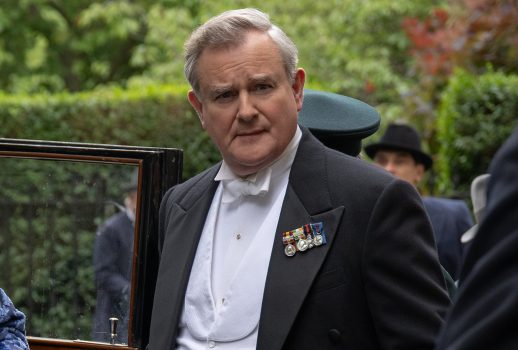Interview by Daniel Welsh for the Huffington Post
The Emmy nominee shares his memories of the late Maggie Smith and opens up about saying farewell to Downton Abbey for good in the new film The Grand Finale.
After six seasons, 15 Emmys, four Baftas and now a full trilogy of spin-off movies, the doors of Downton Abbey are now closing for the final time.
What started in the early 2010s as a cosy Sunday night ITV drama soon blossomed into an international TV phenomenon, culminating in The Grand Finale, the final film in the franchise, which completes the story and arrived in cinemas earlier this week.
Over the years, Downton’s expansive ensemble cast has grown and changed, but at the centre of it all has always been Hugh Bonneville as the dependable Robert Crawley, the Earl of Grantham, and head of the central household.
Even 15 years after Downton first premiered, Hugh admits he’s still surprised at the series’ longevity. Indeed, it might have grown into a cultural institution over time, but it’s easy to forget that, when the show premiered, it was written off by many critics.
“We were pretty much told – certainly by the press, and by the mood of the time – that the period drama was dead and no one wanted to watch this sort of stuff,” he recalls to HuffPost UK. “And then, as they say, the rest is history.”
Hugh says that even one Downton Abbey film felt like an impossibility when the original show came to an end. “When we did the final scenes of the TV show 10 years ago, I thought that was going to be that,” he explains. “I thought they’d never get all of us together again.”
And he’s similarly amazed that the production team was able to assemble the Downton Abbey cast’s sprawling for one last hurrah with this third movie, given how many moving parts there are to consider.
“Trying to herd whatever we are, a 12- or 14- or 15-person cast, is quite an extraordinary thing,” he says. “To get us all finally over the line to actually turn up and do it… it was not without obstacle, to be honest. Timings and everything wasn’t easy. Everything had to fall into place. So, all credit to Gareth Neame and Liz Trubridge [the film’s producers] for getting us there.”
If there’s one member of the Downton cast who could be credited with helping put Downton on the map, it would be the late Dame Maggie Smith, whose performance as the Dowager Countess gave the legendary Britsh star one of her most recognisable characters even as her career entered its seventh decade.
“She had two Oscars, and any number of Baftas and awards – I think she did find it quite weird that it was Harry Potter and Downton Abbey that sort of made her get stopped in Sainsburys, and not playing Desdemona to Laurence Olivier’s Othello,” Hugh jokes.
The Grand Finale is the first Downton project without Dame Maggie’s involvement after her iconic character, the formidable Violet Crawley.
“Her character passed away in the second movie, and then we filmed the third without her. And then she passed away a few months after we finished filming,” he recalls. “So, de facto, the final film has become a tribute to her, as well as a farewell to the show. It all seems rather sort of timely in a way.
“We did wonder whether there’d be a Maggie-shaped hole in the middle of it. But the Dowager is referred to enough, with great affection, and there’s enough wit and fun in the rest of the story that her presence is felt, but there’s not a gaping hole.”
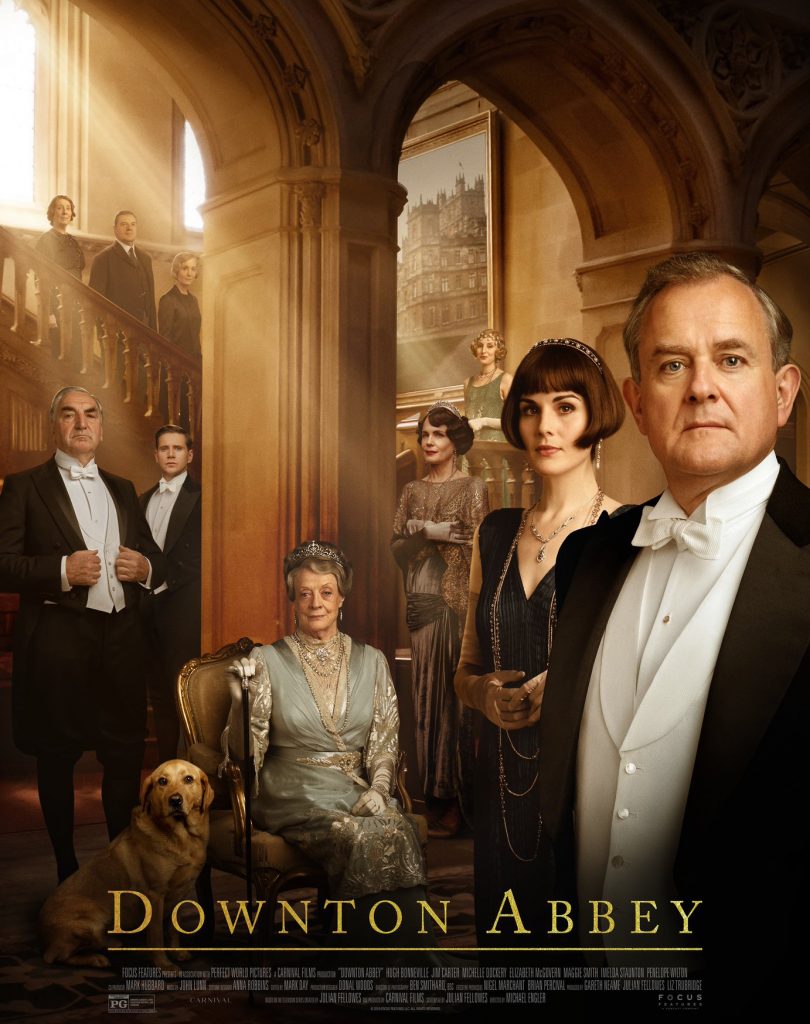
The cast of Downton Abbey, including the late Maggie Smith in the first movie in the franchise. Photo: Focus Features
Hugh reveals how certain scenes where his character reminisces about his late mother left him reflecting on the years he spent working with the screen legend who helped bring her to life.
“I rather liked that scene where we go and see the dower house being cleared of her furniture,” he shares. “I did, on that day, think back to the number of scenes that I spent in that room with Maggie – and obviously, our scenes at the castle. I always felt very blessed to have been in a show where you could watch someone of her calibre.”
He continues: “Maggie was in her 70s when she started the shoot, and I never thought an actress of her stature would be involved. But she came to love it – however curmudgeonly she may have come across in interviews, saying, ‘oh I don’t watch it, I’ve never seen it’. Nonsense – I’m sure she did. And she certainly adored being around the girls, her fictional grandchildren.”
“When she was on song, there was nothing finer than to be on set with Maggie Smith,” he adds. “Her own worst enemy was herself, she’d get very cross if she wasn’t quite hitting the note – and then there’d be one take where she just got it. And that was like watching a boat suddenly start plaining. It takes off onto a different level – there’s a dab of genius in there somewhere that you can’t teach, and you can’t educate and you can’t create, it just comes from somewhere.”
In the 15 years since Downton Abbey first hit our screens, the world has gone through all kinds of economic, social, political and even technological changes.
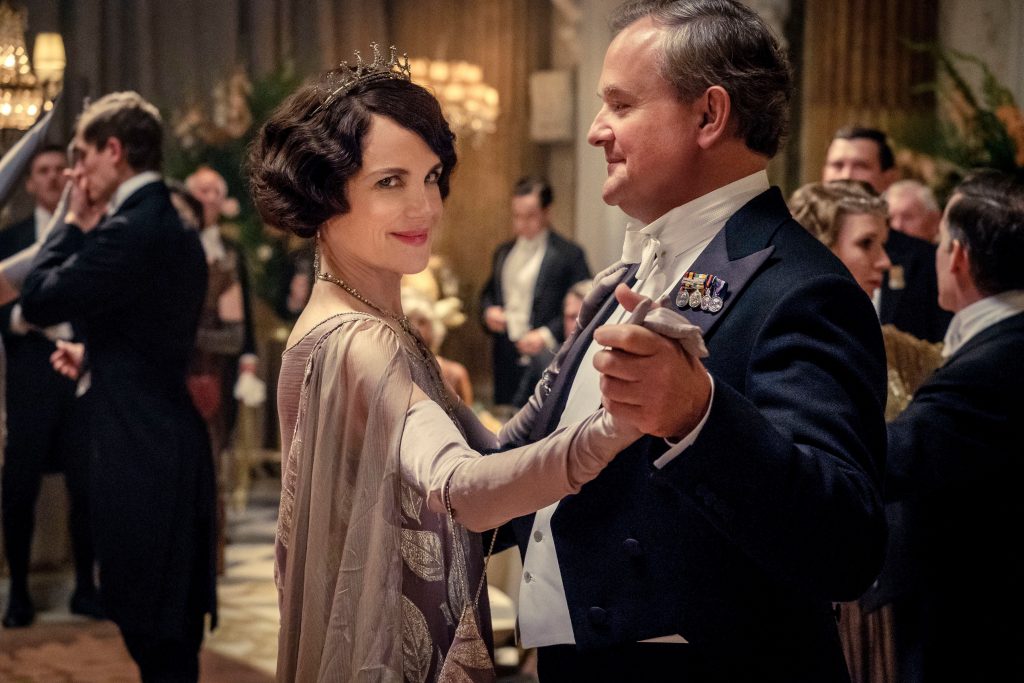
Hugh Bonneville with Elizabeth McGovern in 2019’s Downton Abbey film. Photo: Jaap Buitendijk/Focus/Kobal/Shutterstock
Still, despite the many ways that things are different now, this final outing for Downton arrives at a time when the appetite for period dramas has remained as prevalent as ever, with Netflix’s Bridgerton and the hit US series The Gilded Age (the latter of which is overseen by Downton creator Julian Fellowes) among two of the most popular modern-day examples.
“There is something about escaping into a world that we perceive, rightly or wrongly, to have been a slightly gentler-paced world,” Hugh says of the genre’s continued success. “Those times probably had just as much cruelty as we possess nowadays, but it’s perceived to be a kinder environment.
“Certainly, Julian Fellowes created a benign environment where class divisions or societal differences were tolerated – and even celebrated. But it’s a fictional world, it’s not a documentary, and that’s really important to remember.
“So, there’s something about the world of escape, or escaping into a world that we feel is slower-paced – without AI, without screens, and without the threat of being interrupted on a daily basis by drones or by modern technology. It feels a slightly calmer world, and a nice place to spend an hour or two.”
“This is fiction, and anyone who thinks this is a documentary is bonkers,” Hugh notes. “And, indeed, sometimes the show got a bit of stick for that. But Star Wars doesn’t pretend to be a documentary, it’s just a bit of fantasy – and so is this, albeit set in a world that we perhaps recognise more closely than we do Star Wars or Star Trek or Battlestar Galactica or whatever it might be.
“What we’re looking at, really, is character interaction, and character stories, and those stories are universal. We get as passionate letters about the show from China as we do from Merthyr Tydfil. It’s because Julian Fellowes’ writing is about character, and that’s what has always been so engaging.”
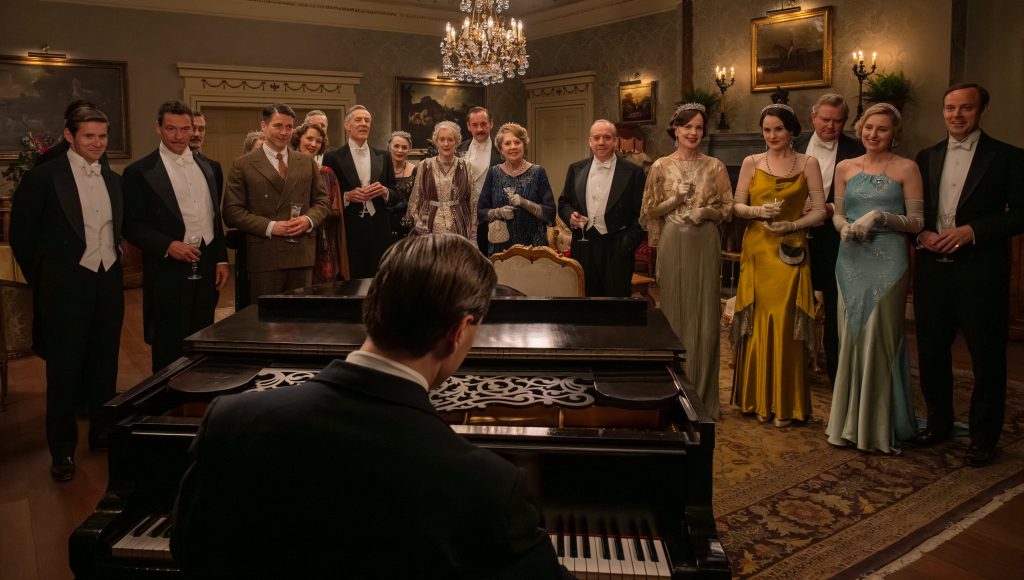
Downton Abbey stars Allen Leech, Dominic West, Robert James-Collier, Douglas Reith, Sarah Crowden, Penelope Wilton, Paul Giamatti, Elizabeth McGovern, Michelle Dockery, Hugh Bonneville, Laura Carmichael and Harry Hadden-Paton (Photo: Rory Mulvey)
Interestingly, while critics of period dramas might dismiss the genre as being for people who are stuck in the past or rooted in nostalgia rather than progress, Downton Abbey, especially in this final instalment, depicts characters who, however reluctantly, embrace new ideas as a way to grow and survive in changing times.
As Hugh puts it: “Life is constantly about change and development. You get stuck in the past at your peril. But at the same time, I think you ignore the past at your peril.
“The mistakes that we’ve made nationally, and internationally, are being repeated – or rather, as they say, history doesn’t repeat itself, but it certainly rhymes. We’re seeing those discordant notes being repeated around the world every single day. And I think, perhaps, louder and more vividly than ever, certainly in terms of our notion of tolerance and understanding of other people’s points of view, as we develop more and more a system of shouting into an echo chamber, or silos, which is no help to anyone.”
“So, if Downton does anything, I think it speaks to a world of tolerance, and compassion,” he continues.
“Why does Downton still resonate so much? I think possibly because those qualities are things that we, as humans, identify with and aspire to, even if we don’t practise them that often. Maybe that’s one of the reasons Downton works, is because it’s a little kinder than reality.”
“Stories that are based in the past, they can teach us a lot,” he adds. “I always loved that Julian Fellowes would create something in each iteration of the story to remind us how close the past is – and yet how far away it seems – be it the invention of the telephone or the wireless or dare I say the refrigerator.
“These were seismic shifts in social accessibility, which are commonplace or second nature to us, but are only a generation or so before us. It’s my grandparents’ generation! So, it’s remarkable how change does seem glacial, but sometimes is far more rapid. Look at AI and how rapidly that’s changing our world.”
For long-time fans of Downton Abbey, The Grand Finale will undoubtedly feel like a fitting farewell to the franchise, with its emotional final moments even catching Hugh off-guard.
“That’s not in the script,” Hugh confesses, revealing he only saw the movie’s final sequence for the first time when he and co-star Michelle Dockery watched it back in a screening room. “I clutched her hand because I didn’t see it coming, and suddenly, there’s 15 years of your life. I wasn’t expecting it at all.”
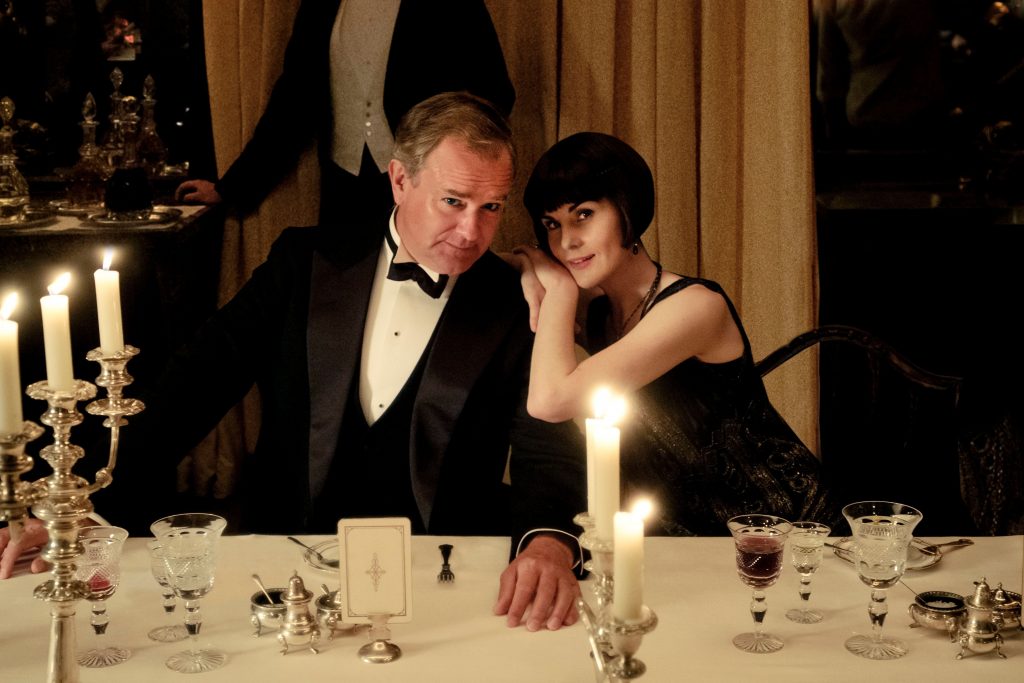
Hugh on the set of Downton Abbey with his on-screen daughter Michelle Dockery (Photo: Jaap Buitendijk/Focus/Kobal/Shutterstock)
And for Hugh, this really does feel like the “completely right” place to end the story, not just because of where we leave the characters, but also the period in history that Downton Abbey leaves off at in The Grand Finale.
“Obviously, the collapse of many of these stately homes between the wars was a significant turning point,” he observes, pointing out that “many collapsed, and very few survived”.
“Whether Downton would have been nimble on its feet,” he adds, is a mystery, remarking: “I’m sure there’ll be plenty of fan-fiction saying what happens next, and how Lady Mary helps George curate a wonderful new estate for the modern era. But I think, certainly Robert Crawley and his generation, their time has come.”
“I think this really is it, it feels like an appropriate closure to the story,” he insists. “I genuinely think we’ve all done our time now – in the nicest possible way. And I think there’s such a thing as flogging a dead horse.”
“But you know,” he adds, cheekily. “If the pay cheque is big enough, you never know.”
Downton Abbey: The Grand Finale is in cinemas now.



